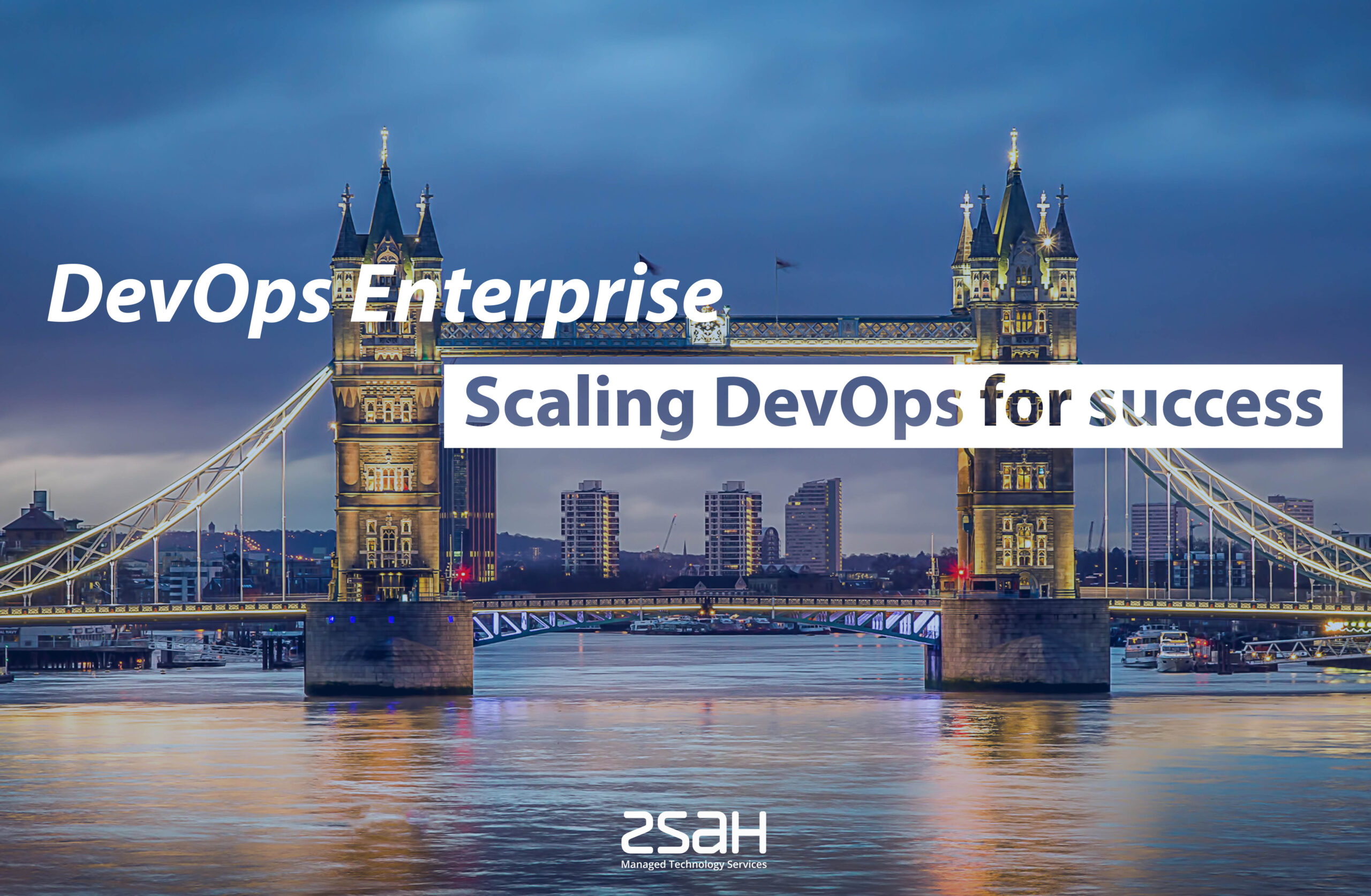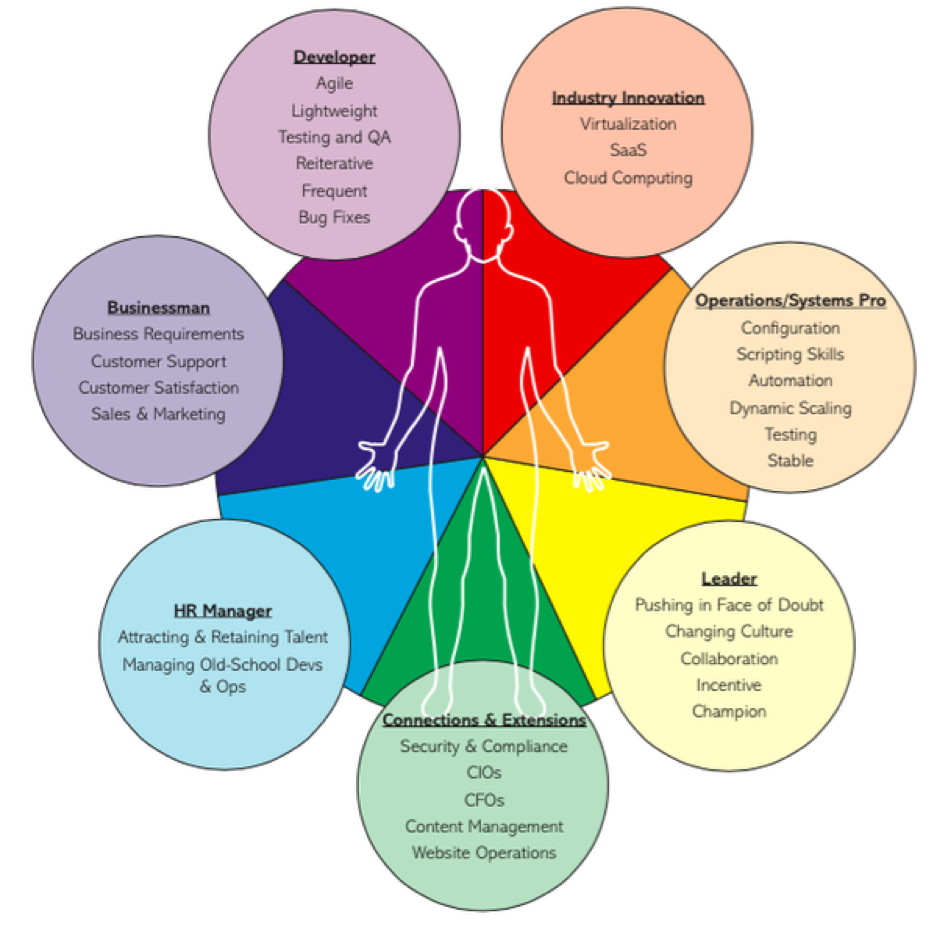DevOps Enterprise – Scaling DevOps for Success

What DevOps Is – and Why It Matters
DevOps is a combined term assembled from Development and Operations, and represents a shared or collaborative approach to the work of an organisation’s application development and IT operations teams. As well as a specific focus on software development, DevOps also embraces the cultural shifts needed to promote better communications and trust between developers, systems administrators, and other business stakeholders. In addition, the philosophy puts an emphasis on aligning technological projects to the business requirements of an organisation.
In a DevOps environment, a number of common features and methodologies usually apply. They include:
- CI/CD or Continuous Integration and Continuous Delivery/Deployment tools for iterative software development and task automation.
- Real-time monitoring, incident management, configuration management and collaboration tools and platforms, to support the adoption of DevOps.
- Cloud computing infrastructure, microservices, and containers.
DevOps is intended to improve work throughout the software development lifecycle (SDLC), and has the ultimate or ideal goal of enabling development teams to create applications that perfectly meet user requirements, deploy in an efficient time frame, and run optimally at the first attempt. Feedback from an initial cycle of planning, coding, building, testing, release, deployment, operation, and monitoring provides the basis for renewed planning, and the recommencement of an iterative loop that leads to continuous improvement.
For the enterprise, this approach leads to the creation of fewer silos, and improved communication between stakeholder groups. With rapid software improvements based on feedback, DevOps optimises the application delivery pipeline, resulting in less downtime and a quicker time to market for the software.
The Issue of Scale
While DevOps stimulates innovation and speeds up software delivery in a contained environment, problems may arise when attempting to replicate this success across multiple projects and teams. However, scaling up is often necessary and desirable, as organisations look to widen their adoption of DevOps and spread its benefits throughout the enterprise. The rush is on, with competitive advantage now associated with improvements and optimisation to the software that underlies and facilitates virtually all business processes.
The problem is that, in attempting to expand DevOps efforts, the tools and processes that work for small-scale use cases often fall short at a wider scale. DevOps expansion must enable the organisation to effectively support all of its different teams, tool kits, applications, processes, workflows, release cycles, and pipelines – both on premises and in the cloud. What’s more, there needs to be consistency between the expanded set of DevOps tools, processes, and automation policies to ensure that application delivery speed, quality, and security meet the highest standards across all of the enterprise deployments.
Getting the Strategy Right
When looking to expand DevOps capability across larger and/or more numerous projects, the best first step is to create a process and workflow that can be replicated across multiple teams. A unified platform for centralised management is essential at the start. This will enable the organisation to manage from a single location the end-to-end application delivery processes, automation work flows, orchestration, and outcomes of all these processes. Centralised management will provide the enterprise with clear visibility and a single source of truth for all of its software assets.
At all stages of the software lifecycle, enterprise DevOps needs to incorporate security and compliance checking. This should include all third-party contributors and open source components, as well as cloud-based assets and microservices – all of which may introduce security vulnerabilities, configuration errors, and compliance loopholes. In effect, the organisation needs to adopt a DevSecOps (Development, Security, Operations) approach that applies security planning, scanning, testing, and reviews continuously throughout the DevOps cycle.
Enterprise DevOps also requires the organisation to create a platform that supports both legacy applications and on-premises infrastructure, and the newer cloud-native applications and microservices. This will enable the business to manage application delivery pipelines across mixed environments, and provide future-proofing as the organisation modernises its operations, or shifts more assets to the cloud.
Having the ability to define application delivery pipelines as code will assist in efforts at scaling DevOps for the enterprise. Storing pipeline definitions in your source control repository increases the productivity of your development team, by enabling them to share, reproduce, audit, and create version histories for these assets. This approach can also enable the organisation to standardise its CI/CD and other automation processes.
While a centralised management approach will provide the organisation with a systematic and holistic view of its entire DevOps ecosystem, it is also important to provide development teams with the power to act locally and with some degree of autonomy. This might be necessary, for example, where different security policies apply to various lines of business, or where specific tools are required for certain use cases.
Organisations should take a proof-based approach when proceeding with expansion. This means establishing relevant metrics to measure progress, and taking on only those DevOps initiatives that illustrate measurable goals in terms of time, cost, or other advantages.
Finally, note that DevOps is as much a mindset as a set of methodologies. Its deployment and scaling typically requires team members to assume a variety of roles, and the ecosystem as a whole involves numerous stakeholders, as illustrated in the infographic below:
[Image source: 451 Research]
Assembling the Right Team
A key strategy for scaling DevOps to enterprise levels is to provide software, utilities, and delivery infrastructure to enable DevOps-as-a-Service for all internal teams, who then gain access to shared tools, processes, and governance. Responsibility for providing these resources falls to DevOps platform teams (also referred to as Platform Ops or Delivery Services teams).
To improve the speed, productivity, reliability, and Total Cost of Ownership (TCO) of application development, these teams will often use pipelines-as-code as a way of scaling and accelerating DevOps adoption throughout the enterprise. DevOps platform teams will also take a centralised approach to managing a number of critical assets, including self-service tools and catalogues, vetted open source components, access controls, and shared binaries.
Using the Right Tools
Standard DevOps deployments typically rely on a CI/CD pipeline, containers, and cloud hosting. These tools may be proprietary, open source, or supported distributions of open source technology. Common components include code or artifact repositories, CI/CD pipeline engines, containers, configuration management systems, cloud infrastructure, and monitoring tools.
For DevOps at scale, a DevOps platform should automate and orchestrate all point tools, processes, package types, and environments. It should also provide support for all technology stacks and artifacts, so that the enterprise can easily plug in its existing tool set and legacy scripts.
Choosing the Right Partner
As deployments expand, enterprises must incorporate more of their people and teams into DevOps collaboration efforts. This enables organisations to truly reap the benefits associated with DevOps, such as speed, efficiency, responsiveness, improved collaboration, and visibility. Scaling DevOps to enterprise levels is by no means a trivial endeavour – and having a reliable technology and development partner always helps.
At zsah, our managed technology services include strategy, consulting and implementation of Private Cloud, Hybrid Cloud (through our award-winning Gridz management tool), Smart Disaster Recovery, Network Security Audits, GDPR Compliance and bespoke Data & Analytics Solutions. Today, we are actively working with global companies, SME businesses, and software and services companies who desire to have the services of a dedicated Managed Services and Application Hosting provider.
If you’d like to know more about how zsah can assist in your efforts to scale DevOps for the enterprise, get in touch with us.


